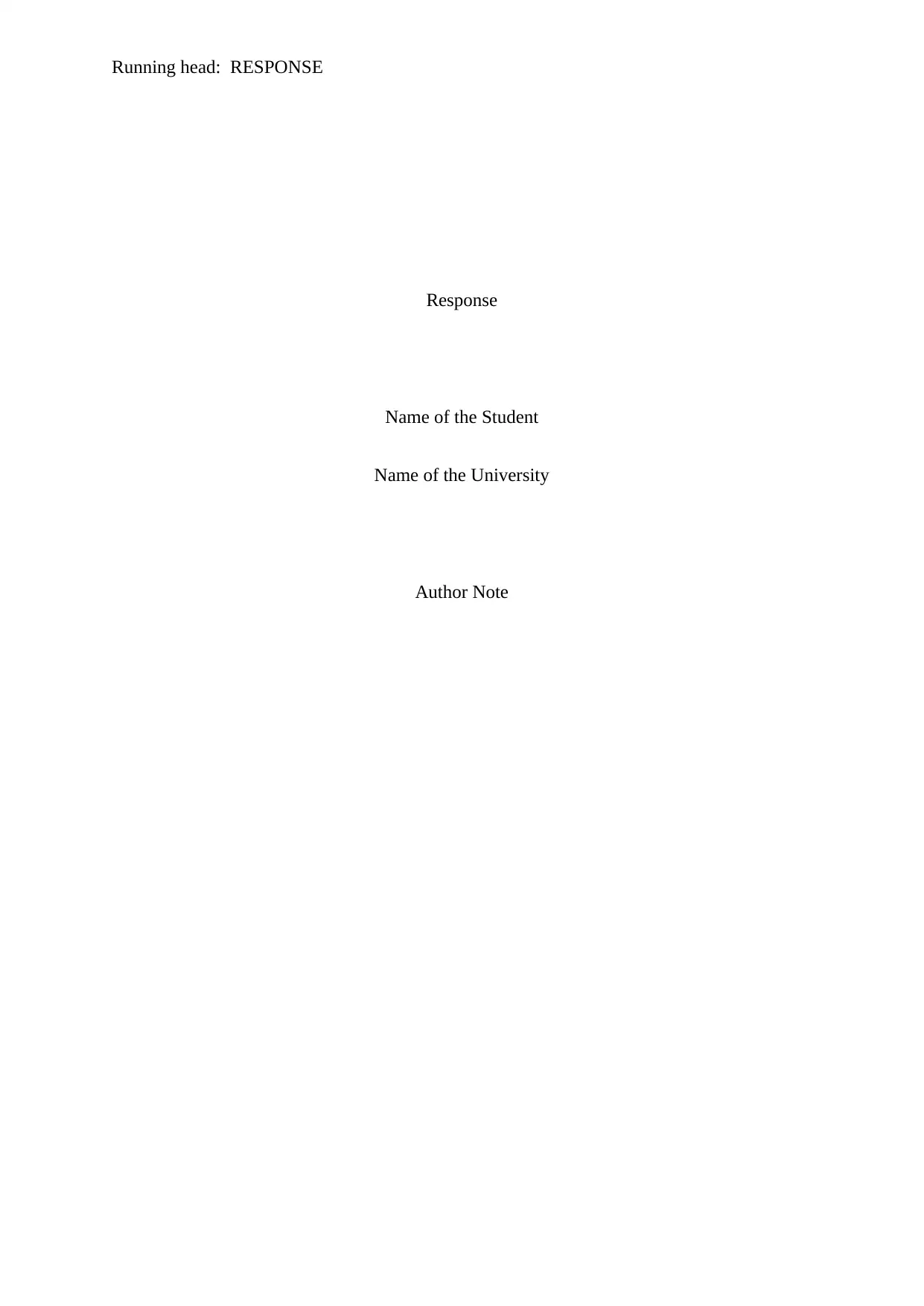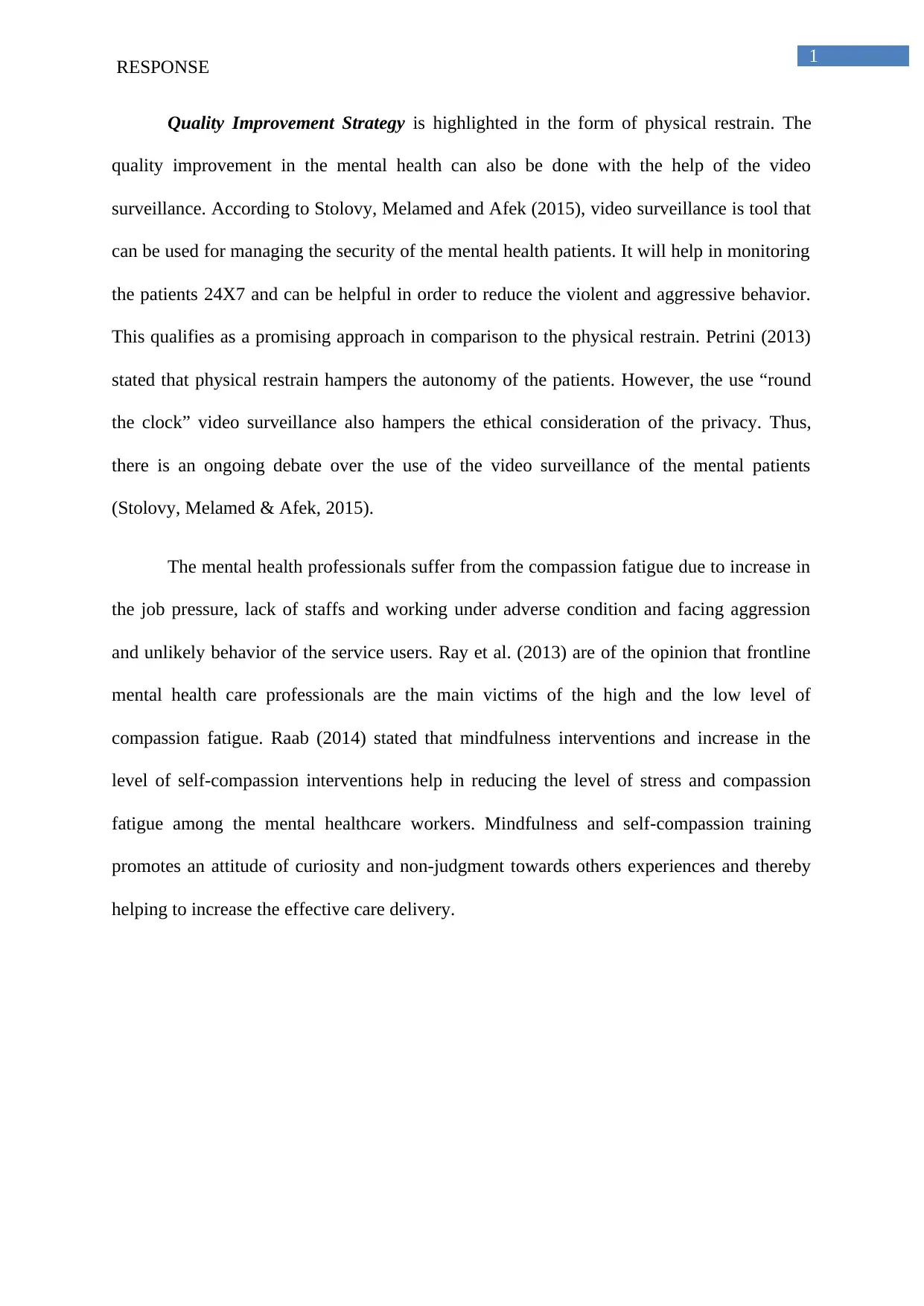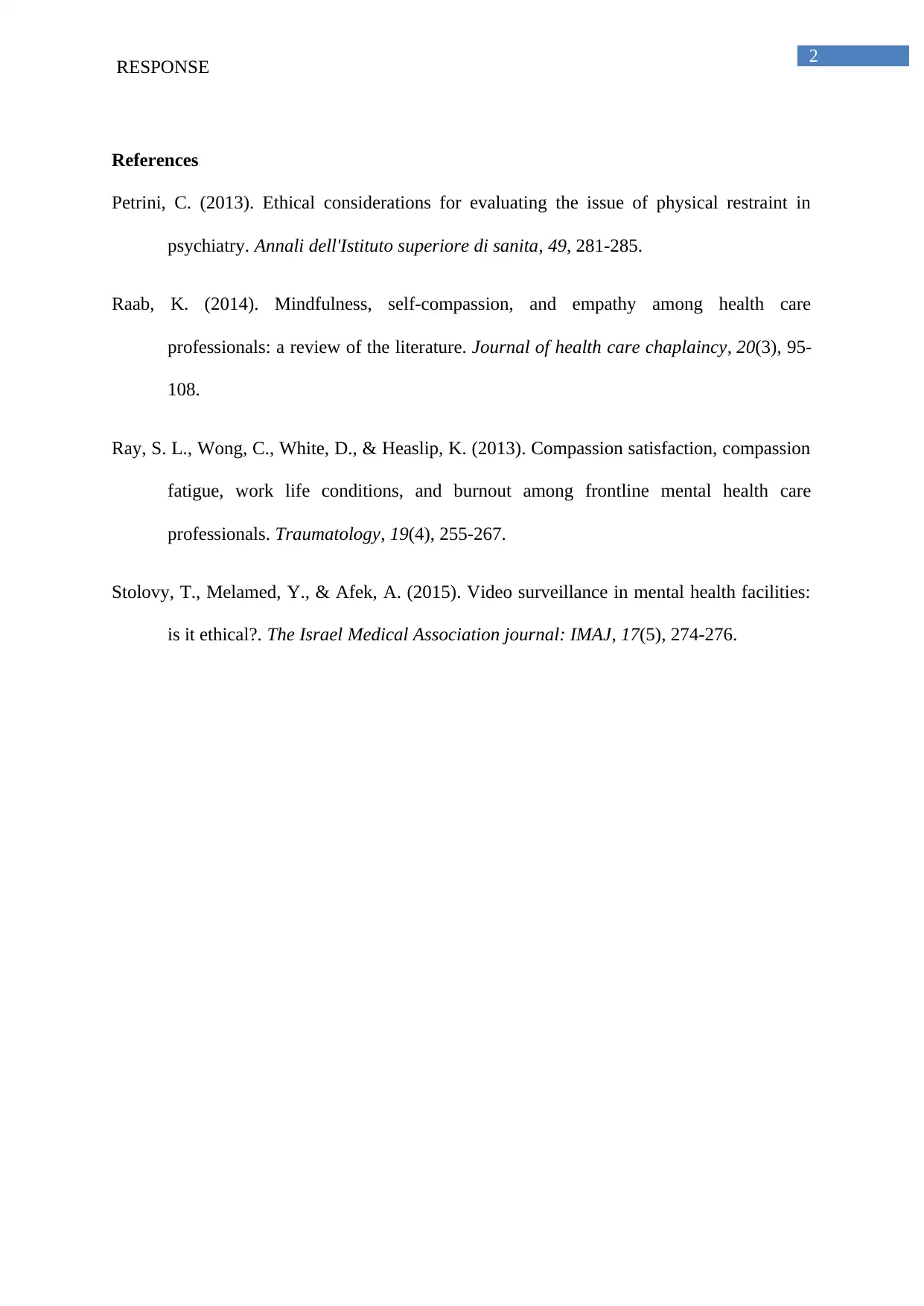RESPONSE. Response. Name of the Student Name of the Uni
VerifiedAdded on 2023/04/21
|3
|461
|442
AI Summary
Contribute Materials
Your contribution can guide someone’s learning journey. Share your
documents today.

Running head: RESPONSE
Response
Name of the Student
Name of the University
Author Note
Response
Name of the Student
Name of the University
Author Note
Secure Best Marks with AI Grader
Need help grading? Try our AI Grader for instant feedback on your assignments.

1
RESPONSE
Quality Improvement Strategy is highlighted in the form of physical restrain. The
quality improvement in the mental health can also be done with the help of the video
surveillance. According to Stolovy, Melamed and Afek (2015), video surveillance is tool that
can be used for managing the security of the mental health patients. It will help in monitoring
the patients 24X7 and can be helpful in order to reduce the violent and aggressive behavior.
This qualifies as a promising approach in comparison to the physical restrain. Petrini (2013)
stated that physical restrain hampers the autonomy of the patients. However, the use “round
the clock” video surveillance also hampers the ethical consideration of the privacy. Thus,
there is an ongoing debate over the use of the video surveillance of the mental patients
(Stolovy, Melamed & Afek, 2015).
The mental health professionals suffer from the compassion fatigue due to increase in
the job pressure, lack of staffs and working under adverse condition and facing aggression
and unlikely behavior of the service users. Ray et al. (2013) are of the opinion that frontline
mental health care professionals are the main victims of the high and the low level of
compassion fatigue. Raab (2014) stated that mindfulness interventions and increase in the
level of self-compassion interventions help in reducing the level of stress and compassion
fatigue among the mental healthcare workers. Mindfulness and self-compassion training
promotes an attitude of curiosity and non-judgment towards others experiences and thereby
helping to increase the effective care delivery.
RESPONSE
Quality Improvement Strategy is highlighted in the form of physical restrain. The
quality improvement in the mental health can also be done with the help of the video
surveillance. According to Stolovy, Melamed and Afek (2015), video surveillance is tool that
can be used for managing the security of the mental health patients. It will help in monitoring
the patients 24X7 and can be helpful in order to reduce the violent and aggressive behavior.
This qualifies as a promising approach in comparison to the physical restrain. Petrini (2013)
stated that physical restrain hampers the autonomy of the patients. However, the use “round
the clock” video surveillance also hampers the ethical consideration of the privacy. Thus,
there is an ongoing debate over the use of the video surveillance of the mental patients
(Stolovy, Melamed & Afek, 2015).
The mental health professionals suffer from the compassion fatigue due to increase in
the job pressure, lack of staffs and working under adverse condition and facing aggression
and unlikely behavior of the service users. Ray et al. (2013) are of the opinion that frontline
mental health care professionals are the main victims of the high and the low level of
compassion fatigue. Raab (2014) stated that mindfulness interventions and increase in the
level of self-compassion interventions help in reducing the level of stress and compassion
fatigue among the mental healthcare workers. Mindfulness and self-compassion training
promotes an attitude of curiosity and non-judgment towards others experiences and thereby
helping to increase the effective care delivery.

2
RESPONSE
References
Petrini, C. (2013). Ethical considerations for evaluating the issue of physical restraint in
psychiatry. Annali dell'Istituto superiore di sanita, 49, 281-285.
Raab, K. (2014). Mindfulness, self-compassion, and empathy among health care
professionals: a review of the literature. Journal of health care chaplaincy, 20(3), 95-
108.
Ray, S. L., Wong, C., White, D., & Heaslip, K. (2013). Compassion satisfaction, compassion
fatigue, work life conditions, and burnout among frontline mental health care
professionals. Traumatology, 19(4), 255-267.
Stolovy, T., Melamed, Y., & Afek, A. (2015). Video surveillance in mental health facilities:
is it ethical?. The Israel Medical Association journal: IMAJ, 17(5), 274-276.
RESPONSE
References
Petrini, C. (2013). Ethical considerations for evaluating the issue of physical restraint in
psychiatry. Annali dell'Istituto superiore di sanita, 49, 281-285.
Raab, K. (2014). Mindfulness, self-compassion, and empathy among health care
professionals: a review of the literature. Journal of health care chaplaincy, 20(3), 95-
108.
Ray, S. L., Wong, C., White, D., & Heaslip, K. (2013). Compassion satisfaction, compassion
fatigue, work life conditions, and burnout among frontline mental health care
professionals. Traumatology, 19(4), 255-267.
Stolovy, T., Melamed, Y., & Afek, A. (2015). Video surveillance in mental health facilities:
is it ethical?. The Israel Medical Association journal: IMAJ, 17(5), 274-276.
1 out of 3
Your All-in-One AI-Powered Toolkit for Academic Success.
+13062052269
info@desklib.com
Available 24*7 on WhatsApp / Email
![[object Object]](/_next/static/media/star-bottom.7253800d.svg)
Unlock your academic potential
© 2024 | Zucol Services PVT LTD | All rights reserved.
